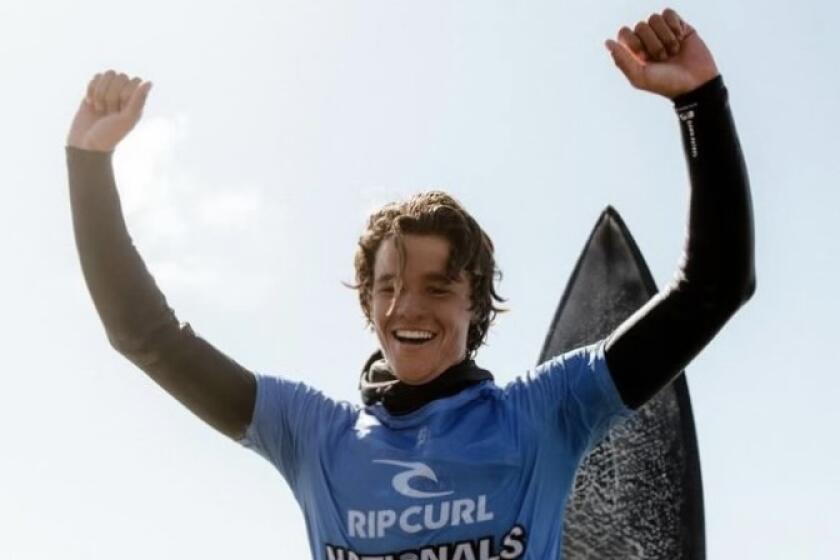Losers Who Win : Probation Camp’s Football Team Gives Players a Clinic for Success
Every football coach since the creation of the drop-kick has echoed the hoary cliche about football being a metaphor for life.
Too bad they couldn’t have seen what a crowd of 150 people saw at a football field in Brentwood a weekend ago.
There was a tiny, patched-together team of street gang members and other juvenile delinquents, inmates of a county camp, slugging it out on even terms in a California Interscholastic Federation playoff game with a much bigger and, by all accounts, much better team from a private high school that charges tuition of $7,600 a year.
Was this going to be a Cinderella story or what?
Stay tuned.
Ostensibly it was nothing special. A quarterfinal game in the CIF’s eight-man high school football program, which draws schools too small to field full teams of 11. The Brentwood High Eagles versus the Camp Kilpatrick Mustangs.
Change in Agenda
Camp Kilpatrick, hidden in the Santa Monica Mountains above Malibu, is run by the county Probation Department. It draws its residents from kids too bad for Juvenile Hall and too young or not bad enough for the California Youth Authority.
Nobody ever went to a county camp expecting to play tackle football. What you’re supposed to do is behave and take requisite academic classes. But last fall, Kilpatrick experimented with a basketball team and gradually the idea grew that the camp could form a football team--never before attempted in the county--to teach discipline and teamwork to youngsters whose sorry lack of those qualities is routinely splashed over newspaper pages.
The camp normally houses younger inmates, 13 to 15, so the man brought in to be football coach, a probation officer named Howard Gold, was asked to recruit. He went to San Fernando Valley Juvenile Hall and, following the dictates of county probation officials, looked not just for athletic talent but for kids who had shown some academic stability, the kind of kids who might be salvaged and channeled into a community college football program if they could square their attitudes.
Gold had help. Mo Friedman, a probation camp teacher and an experienced coach who’d played center for UCLA in the mid-1960s, and Sean Porter, a probation officer, would be his assistants. Remember, everybody told themselves, the idea is to teach the work ethic, pride, discipline and sportsmanship.
Winning is not important. Winning is not important.
Immediately, the Mustangs began winning. Part of this, the coaches admitted, was because they’d scheduled some acknowledged patsies, anticipating that it would be difficult to mold a cohesive team out of rival gang members, the majority of whom had not played high school football. But in its third game, Kilpatrick beat the top-ranked eight-man team, Faith Baptist. There were, of course, the kind of discipline problems that routinely occur in county camps. Players were suspended. Lessons had to be taught not only about how to block but how to thank the guy who blocked when you carried the ball.
“I didn’t think it was going to work out at first,” said Ken Polee, 17, of Compton, who had been arrested on drug and gun-possession charges and became the team’s top defensive player. “But we started showing each other we wanted to play. We learned how to have compassion, how to help each other.”
“I learned to feel respect and how to get respect,” said Michael Boyd, a small, slender 18-year-old from South-Central Los Angeles who had been incarcerated for assault. “What surprised me was that we got over the gang thing, learning to play with guys from other neighborhoods who’d be enemies where we grew up.”
Ernie Llentonda, 18, of La Puente, learned something else. He came to Kilpatrick with 298 pounds on his 5-foot-11 body. As the team practiced each afternoon, he began losing weight. He liked it. He started running on his own. He began dieting. He lost nearly 90 pounds, and when he went home on a furlough he walked through his neighborhood unrecognized.
“What I like about this,” said Gold, “is that it gives kids a chance for success where most of them have never been successful at anything except selling dope or killing people. We were driving back from one game and a kid sitting behind me said, ‘This is the first time I’ve ever been good at anything. I didn’t know I could do anything but gang-bang.’ ”
Exhausting for Coaches
Still, it was an exhausting experience for the coaches because they never knew what to expect. The football players were living together in a separate dormitory--part of a master plan by Steve Canin, assistant to the county’s chief probation officer, to form a motivational sports program at Kilpatrick that would bring handpicked juvenile inmates to the camp to participate in half a dozen sports. The coaches worried that the team was turning into something too elite for its own good.
And they had to balance their own desire to win with their original goals. It was not right, they knew, to feel disappointment when a boy left the team in mid-season because he had accumulated enough good behavior “points” to be discharged.
The camp team began the year with 24 players. It won 7 games, lost 1, tied 1 and made the playoffs. By that time, however, there were only 15 players left. Gold had suspended his top quarterback and guard for poor behavior, and his best running back had a sprained ankle. Half the team would have to play the entire game against Brentwood, which had twice as many players, bigger players as good as any at some large high schools.
The Brentwood field is built into a bowl off Sunset Boulevard, below a charming side street. Some Brentwood students brought low-backed lawn chairs to sit near the sidelines. Brentwood had uniformed cheerleaders and enthusiastic parents. Camp Kilpatrick had Sean Porter, his face sunburned angry red, hollering at the silent, contemplative players in the tiny locker room before the game.
“Here and in the real world, the only thing you can control is you!” Porter bellowed. “As long as you give 100% you know who and where you are.”
“You can do more than people think you can,” Gold added.
They did. It was 6-0 Kilpatrick at half-time. Kilpatrick’s players had started sluggishly but began to dominate the game with each series of plays. They were faster than Brentwood, and they were hitting harder. Brentwood’s fans watched in stunned silence.
Half-Time Pep Talk
“Hey!” Friedman exploded at the players after they had returned to the locker room at half-time. “This is the greatest thing in the world, because we--individually--are doing it.”
Everyone was tired. Suck it up, the coaches said, the way football coaches always do.
The Mustangs held together through most of the third quarter. Then Brentwood surged and its star back, Jay Langan, ran for a touchdown. A two-point conversion put Brentwood ahead. Its fans were noisy and confident. The Mustangs looked ready to crack.
They didn’t. They squeezed out several first downs, pushing the ball as far as Brentwood’s 17-yard-line. Finally, though, the drive ended.
Brentwood had the ball again, and this time it drove the length of the field for a second touchdown. It was 15-6, and when the Mustangs got the ball back they might as well have run out the clock, but they didn’t. With little more than two minutes to go they pushed it down to Brentwood’s 16-yard line, but could go no further. Brentwood took over, ran out the clock and celebrated.
Earlier in the year, the Kilpatrick coaches talked about how their kids would accept adversity and success, whether they cared enough about either to be moved. Some of these youngsters had been so hardened by life on the streets that they took on the numbed, uncaring stance of much older men. It is a look that says they cannot be hurt because they do not care.
Now, on the Kilpatrick sideline, several players were crying. A few teammates embraced and consoled them. Several players’ parents had driven out to see the game and to share a few moments with their sons after the final gun. One of them brought a player’s baby girl onto the field so the boy could cradle his child.
Coaches’ Message
The coaches were still bellowing at the players, but with a different message.
“You got nothing to be ashamed of!” Porter said.
“You’re men who played hard!” Gold said.
Boyd, who had not only quarterbacked but played defensive back, listened, exhausted, eyes red. “Michael,” Gold said, “You know what the other team’s coach just told me? He told me you guys were fantastic.”
A couple of days later the headmaster of Brentwood, who rarely writes letters about football games, wrote to Kilpatrick, complimenting the camp on the comportment of its players and inviting Kilpatrick to be Brentwood’s 1989 homecoming game opponent.
On the bus back to camp after the game a Kilpatrick lineman who had probably cried the hardest of anyone, sobbing uncontrollably as he sat on the bench, tried to apologize for his tears to Mo Friedman.
“Coach,” he said, “I couldn’t help it. It just meant so much to me.”
“Hey,” Friedman said, “welcome to humanity.”
Get our high school sports newsletter
Prep Rally is devoted to the SoCal high school sports experience, bringing you scores, stories and a behind-the-scenes look at what makes prep sports so popular.
You may occasionally receive promotional content from the Los Angeles Times.



